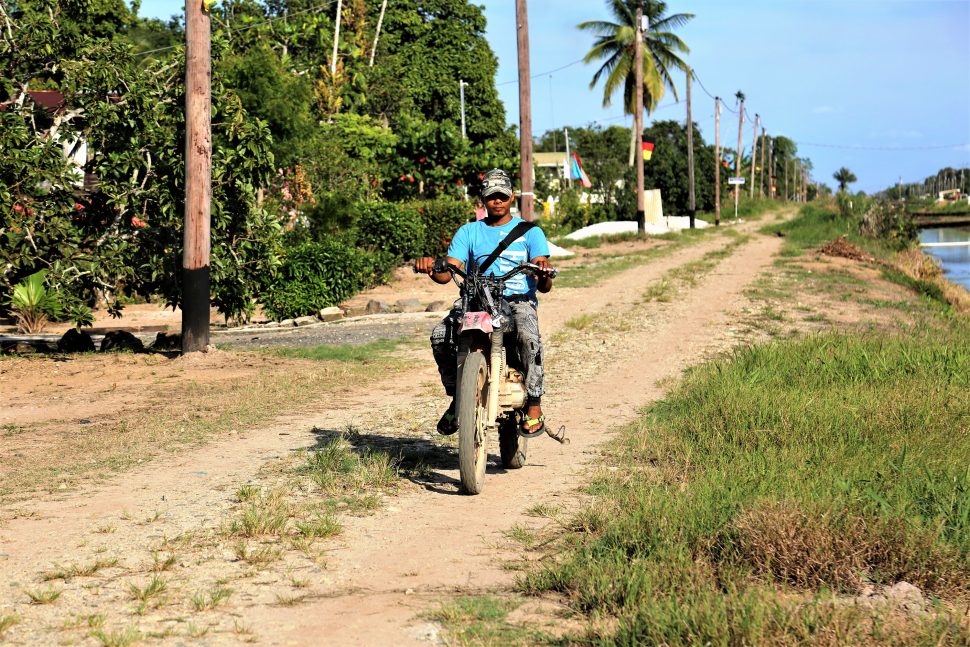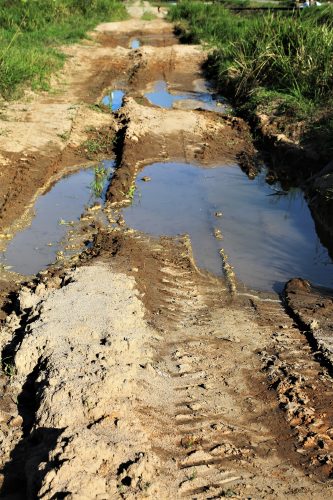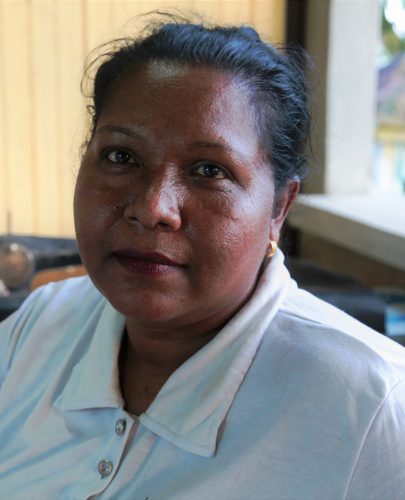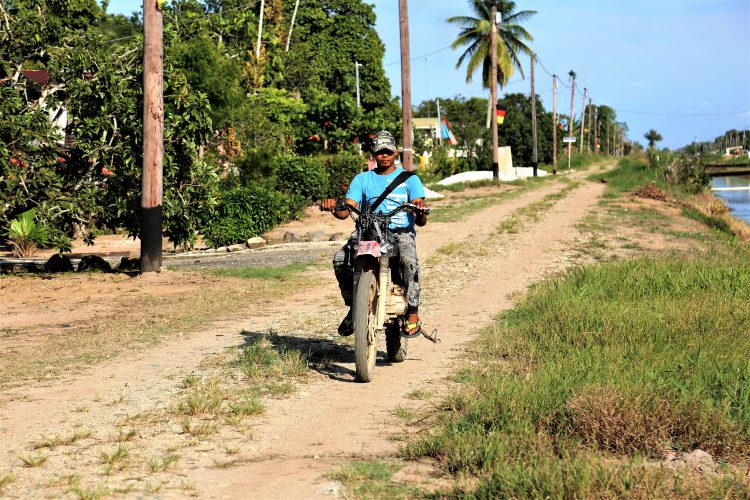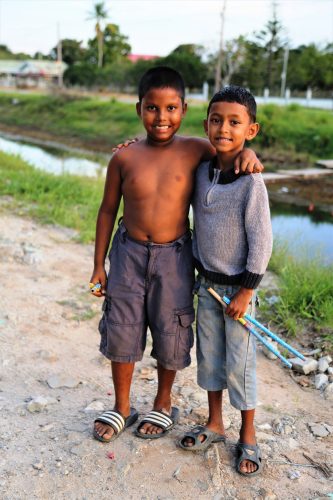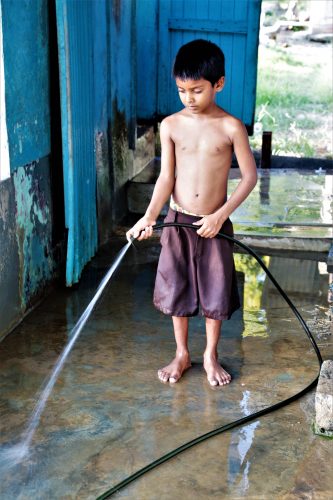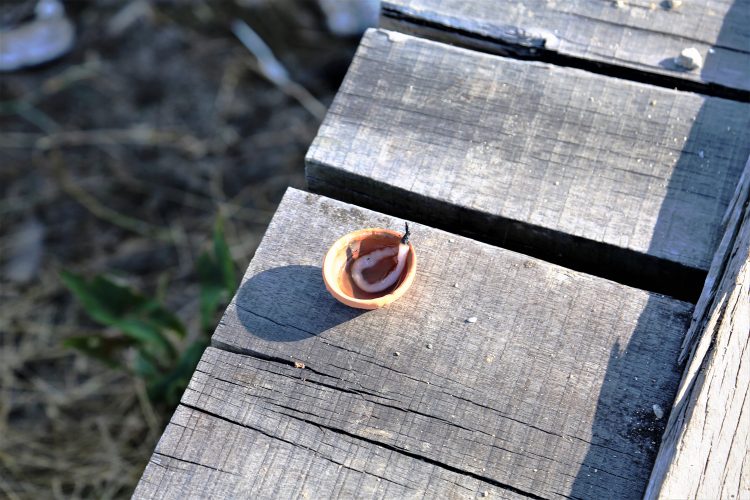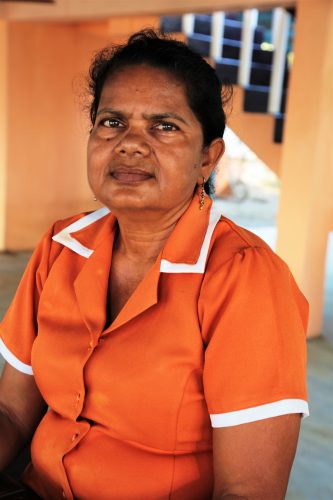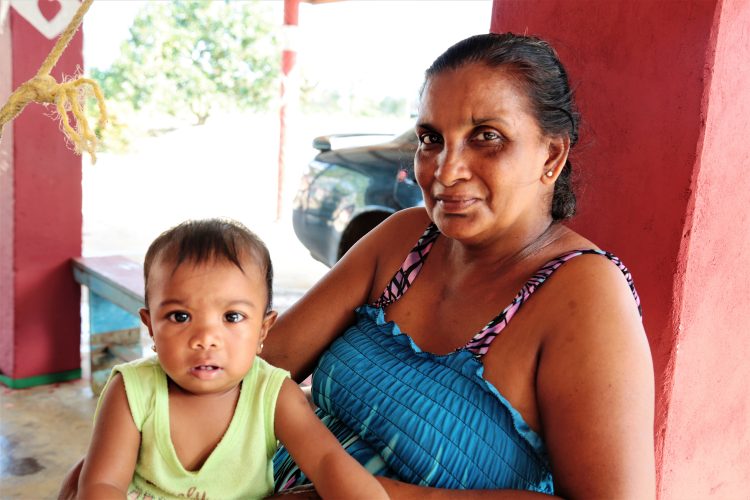Tenez Ferme is a sprawling community along the Canal Number One Polder Dam that serves as a haven for the more than 100 people residing there. The name of the village ‘Tenez Ferme’ is French and translates to ‘hold firm’.
Almost every resident pronounces the village’s name as ‘Tennis Farm’. Fruit trees of all kinds grow along the dam with coconut, avocado, bilimbi (souree) and banana making the list. Flower plants take up whatever available space is left from the planting of fruit trees and cash crops.
The villagers are kind, though reserved. Many of the original residents migrated to the US and Canada, so most of the current ones settled there from other parts of Guyana during the last few decades, although the village is believed to have been in existence for centuries.
The farming community has several bridges leading from the Canal Number One main road, but almost all of them are either too small or have a gate to prevent vehicular access to the dam, so that traffic would not destroy the dam. However, this has not stopped tractors from making the dam a deplorable mess, especially during the rainy season; gaping potholes decorate it. This was the biggest concern of the residents since they are often unable to access parts of the dam and are forced to either take the public road to get to another part of the dam or walk through their neighbours’ yards.
Tarmattie Boodine sat across from her granddaughter in a crib glancing over at her to make sure she was okay every now and again while we spoke. She hails from Bee Hive on the East Coast Demerara and had moved to Tenez Ferme after she married. She and her husband raised their three children and worked laboriously on their farm, even until today. It has been more than 30 years.
The shy woman quietly explained that moving from her old home took much adjusting, as Bee Hive was a brighter community. Her closest neighbours were a family five lots away. In the afternoons, she made her way over to their home for company and conversation. Eventually, she sent for her 13-year-old sister to live with her. When her sister arrived, she shared, she missed home less often. The family she had grown close to, she added, was one of the families that migrated.
Boodine said that her sister assisted her in the home while she worked alongside her husband on their farm. They planted mostly ground provision, which they sold at Stabroek Market on weekends. Today, however, they plant on a much smaller scale and sell from home. While she gets her groceries from mobile shops that come along the public road, her farm provides fruits and vegetables.
Looking back to when she first moved, the woman said she could not go back to the bright life of Bee Hive and would much rather her quiet village where nothing exciting happens.
She is disgusted at the state of the road that she and other residents have to put up with, and begs that it be fixed especially now that the rainy season is stepping in.
Seeta Trotz stood in front her home talking to a relative, still attired in her work clothes, having just returned from work. She works as a clinic attendant at the Maniram Memorial Canal Number One Health Centre where she has been employed for the past nine years.
Trotz left her home at Hampton Court on the Essequibo Coast in 1982 and settled in the village of Anna Catherina opposite Tenez Ferme. Hampton Court, she said, thrived on rice farming, while Tenez Ferme planted ground provision, citrus, sugar cane and pineapples mainly. After she married she and her husband planted the same except for sugar cane. The land now, she said, is not as fertile and is therefore slow in producing. Most persons, Trotz said, get by through farming. There is a handful of drivers, a pharmacist and a nurse that hail from the village.
Recalling life on the farm the woman shared that it was hard. Rain or sun, one had to be on the farm. Pineapples were planted in the dry season and were reaped after 18 months. Side by side they grew other crops. Their citrus took nine months until harvest time, while eddoes were harvested every six months. Trotz explained that she worked on the farm even while she was pregnant continuing until she was in the eighth month during her first pregnancy.
Remembering her own children and the ones that grew with her during her childhood, Trotz said that they were more mannerly and showed great respect for their elders. She sadly noted that much has changed since then adding that today, “Children have no regards for anyone.” She holds the internet responsible for most of what the children today have turned out to be saying that while the internet may have its positives, it has been abused so much that morals and respect are fast becoming old fashioned.
Speaking on getting to and from the village, Trotz said that cars traverse all day up until ten or eleven in the night.
The village’s biggest challenge now, she said, is the road. “They just ploughed the middle of the dam, chip it up and left it. When it’s raining we have to park our vehicle at the end of the village and walk to our home. We did this for a long time. They [the politicians] just making promises all the time. PPP come and gone and nothing; now APNU might come and gone and it won’t fix either. It getting overbearing; too long we struggling with this dam,” she said.
Another thing she wishes for is cleaner potable water which she said comes with a lot of iron. Then looking back at the road, she mentioned streetlights, noting that it is bad enough that the dam is in a horrible state but to walk along a muddy road with deep potholes in the dark is even worse.
Coming from her kitchen where she was just getting a few pieces of fish ready for frying Debbie Sukhu smiled as she inquired about my visit. Sukhu was born at the Leonora Estate but grew up in Tenez Ferme. She is a seamstress and has been one for the last 21 years. Behind where she sat a cardboard notice pasted on the wall of her verandah listed all the pieces she could sew and at the prices.
Recalling her time in the village as a girl, her face lit up. “When I was growing up it was very exciting. At that time it had a lot of families living close by. Over the weekend, our cousins would come over and help we finish our housework and we’d help them at other times then we’d pack our basket with ingredients, catch a fowl in the yard and head to the backdam. We would pull couple pieces of cassava and whatever else we could find to add to our soup; we making bush cook. You see them time that we were now learning to cook and we used to be all excited about it. The backdam was 400 rods from my house; we walking to catch the black water trench, sometimes ten of us or more. Who can’t swim used to watch the pot,” Sukhu said. Asked whether she would allow her daughter, sitting close by, to head to the backdam today, Sukhu said that she would never let her go off on her own, but would have to go with her as her daughter has no inkling about that kind of carefree life. The woman added that when they were not enjoying that, they were climbing trees, sometimes the guava tree, the mango or the cashew. She recalled times when their pockets could hold no more cashews and they would tie knots in the bottom of their shirts to allow them to carry more cashews. Many times they didn’t tell the “uncle” that they picked the fruits until they were on their way out, trying to carry them all. The owners never minded that they picked fruits, she said, adding that it was a norm to go fruit picking from the neighbours’ trees.
Sukhu said her children attended the Two Brothers Primary School. Her son now has his own family, while her youngest daughter attends Patentia Secondary. Her second daughter died two years ago.
“My daughter was 11 years old. It was August 27th, 2016, during the school vacation. I had send her out to the road to buy something from the grocery van. I was on the verandah sewing and all I hear was ‘blam’ and I raise up from the machine and see this person pitch in the air and falling back on the road not realizing is she. My sister-in-law, who was now crossing the bridge to go to the van, say ‘Debbie, Amesha!’ Long ago we had them big government bus and they never used to be speeding. Them drivers today driving more than 100 [mph]; some young drivers and plenty of them doesn’t know the road signs.”
Battling back tears, she continued, “She remained unconscious for 14 days. It was very hard to cope with her death. During last year I didn’t sew much. Is only now I trying to get back into the sewing. It does be hard to focus when you see me sewing and I see children walking the road or hear a vehicle passing full speed.”
Turning her attention to the road Sukhu noted that it was done by two contractors. One, she said, did the beginning of the village with crusher run then stopped after which a second contractor did the middle with loam then he left it off. The first contractor continued the end of the village with the crusher run into the next village, but the middle was left as it was. “During the rainy season, this dam is a next canal in here. We try to maintain the dam however we can. One tractor tried and smoothed the sides of the holes so we can manage to pass on the dam. My brother would bring broken concrete from buildings they pull down and we would try to full the holes but what more we gon do. We need the road to fix. I glad if they come and fix the dam especially for the children. We need streetlights too; the nights does be really dark here. We had lights here that a Chinese company had put in but when GPL change the posts, they carry way all the lights; this was months ago when this happen.”
Speaking about the existence of Tenez Ferme, Sukhu noted that her father’s eldest brother is now 90 years old and he was born in the village. She remembers seeing her grandfather’s birth certificate, which showed that he was born in 1801; he too was born there. “Tenez Ferme is hundreds of years old,” she stated.

